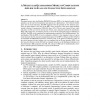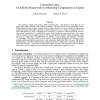429 search results - page 50 / 86 » Turing computations on ordinals |
134
click to vote
IPPS
1998
IEEE
15 years 6 months ago
1998
IEEE
The paper presents how the Random PROLOG Processor (RPP), a bio-inspired model of computations, can be used for formalization and analysis of a phenomenon - the Collective Intelli...
108
click to vote
STACS
2010
Springer
15 years 9 months ago
2010
Springer
Abstract. It is well-known that Abstract State Machines (ASMs) can simulate “stepby-step” any type of machines (Turing machines, RAMs, etc.). We aim to overcome two facts: 1) s...
130
click to vote
COCO
2008
Springer
15 years 3 months ago
2008
Springer
We introduce a simple game family, called Constraint Logic, where players reverse edges in a directed graph while satisfying vertex in-flow constraints. This game family can be in...
ADC
2004
Springer
15 years 7 months ago
2004
Springer
Reflective Relational Machines were introduced by S. Abiteboul, C. Papadimitriou and V. Vianu in 1994, as variations of Turing machines which are suitable for the computation of ...
105
click to vote
BIRTHDAY
2005
Springer
15 years 7 months ago
2005
Springer
Undecidability results in rewriting have usually been proved by reduction from undecidable problems of Turing machines or, more recently, from Post’s Correspondence Problem. Ano...


